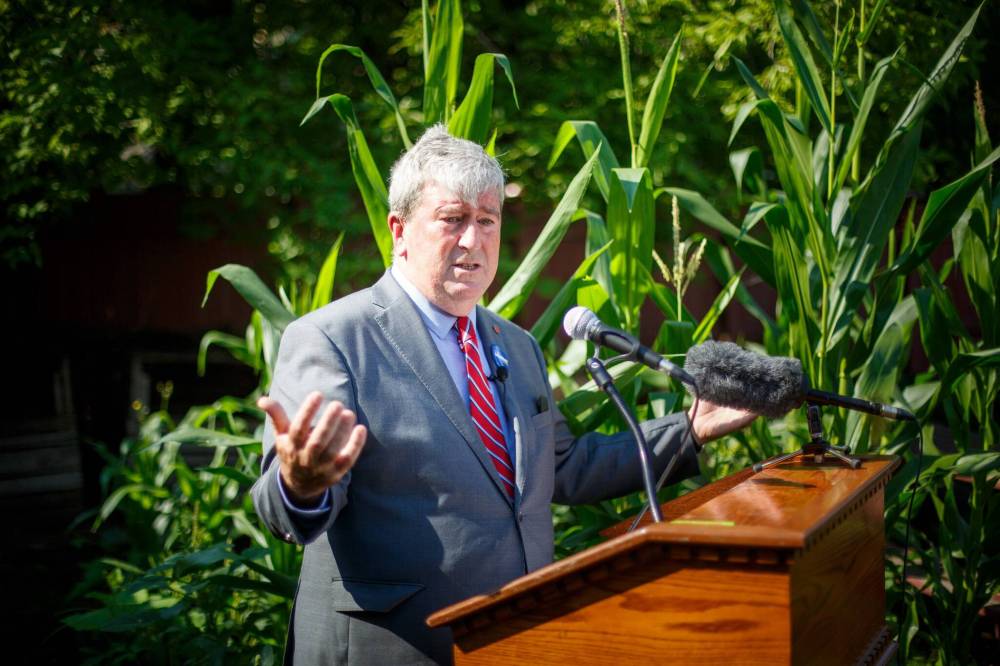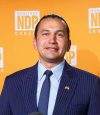Mayoral candidate Murray pledges quicker turn to green Transit fleet
Advertisement
Read this article for free:
or
Already have an account? Log in here »
To continue reading, please subscribe:
Monthly Digital Subscription
$19 $0 for the first 4 weeks*
- Enjoy unlimited reading on winnipegfreepress.com
- Read the E-Edition, our digital replica newspaper
- Access News Break, our award-winning app
- Play interactive puzzles
*No charge for four weeks then billed as $19 plus GST every four weeks. Offer only available to new and qualified returning subscribers. Cancel any time.
Read unlimited articles for free today:
or
Already have an account? Log in here »
Hey there, time traveller!
This article was published 11/09/2022 (835 days ago), so information in it may no longer be current.
A mayoral candidate is promising, if elected, to replace all of Winnipeg Transit’s diesel buses with zero-emission models by 2030 and add more service to the busiest routes.
“We have a plan to drive billions in economic development, reduce long-term costs for the city, lower greenhouse gas emissions… and grow Transit ridership significantly in Winnipeg,” Glen Murray said during a Monday news conference.
Murray’s plan calls to add more frequent service on 13 key Transit routes, where environmentally friendly buses would arrive every 10 minutes for 15 hours per day. He expects the move to cost about $36 million per year, which he believes federal funding would “largely” cover.

MIKE DEAL / WINNIPEG FREE PRESS
Mayoral candidate Glen Murray is promising, if elected, to replace all of Winnipeg Transit’s diesel buses with zero-emission models by 2030 and add more service to the busiest routes.
The mayoral candidate stressed the environmental value of the project warrants an expedited effort. “Zero-emission vehicles will eliminate 100 metric tonnes of greenhouse gases per year per bus. Each bus can take 80 people out of cars.”
Murray said he’d also pursue more rapid transit development, which could vary between dedicated corridors and much cheaper on-street routes, depending on the potential development each route has the potential to attract around itself.
The candidate did not estimate the full price of his transit commitments. In an interview, Murray said the exact cost to green up the city’s 640-bus fleet, and many of his other promises, would require further study.
During the news conference, he predicted efficient transportation routes would trigger new developments and tax dollars that would outweigh the upfront costs.
“This is growing the tax base, not growing the tax burden,” he said.
Murray said he’d also create an Urban Surface Transit Innovation Lab to support bus electrification that would drive “billions in economic activity within the province,” aided by strategic partnerships with Manitoba Hydro, smart-tech companies and others.
The target to replace all diesel buses would significantly speed up goals the City of Winnipeg currently has in place. In early 2021, Transit unveiled a target to replace 100-110 diesel buses with zero-emission models by the end of 2027, at a cost of $280 million, which the city has now secured federal and provincial funding to support.
Transit also hopes to replace 30 per cent of its diesel fleet with greener models by 2030, and replace the entire fleet by 2047.
Murray said more work is needed to determine what portion of electric battery buses and hydrogen fuel cell battery electric buses should be purchased to replace diesel models.
He also promised to study light rail “crosstown lines,” for potential use in a second phase of rapid transit expansion about a decade from now.
Winnipeggers will elect their next mayor and council Oct. 26.
joyanne.pursaga@freepress.mb.ca
Twitter: @joyanne_pursaga

Joyanne Pursaga
Reporter
Born and raised in Winnipeg, Joyanne loves to tell the stories of this city, especially when politics is involved. Joyanne became the city hall reporter for the Winnipeg Free Press in early 2020.
Our newsroom depends on a growing audience of readers to power our journalism. If you are not a paid reader, please consider becoming a subscriber.
Our newsroom depends on its audience of readers to power our journalism. Thank you for your support.








